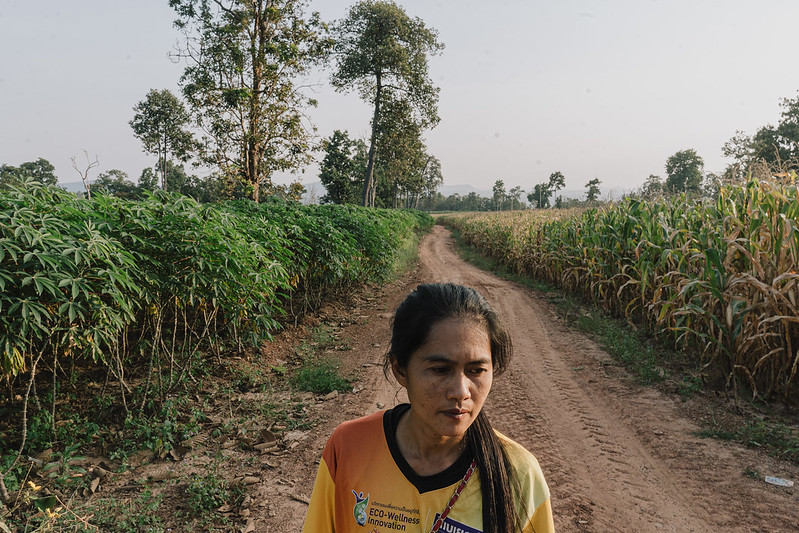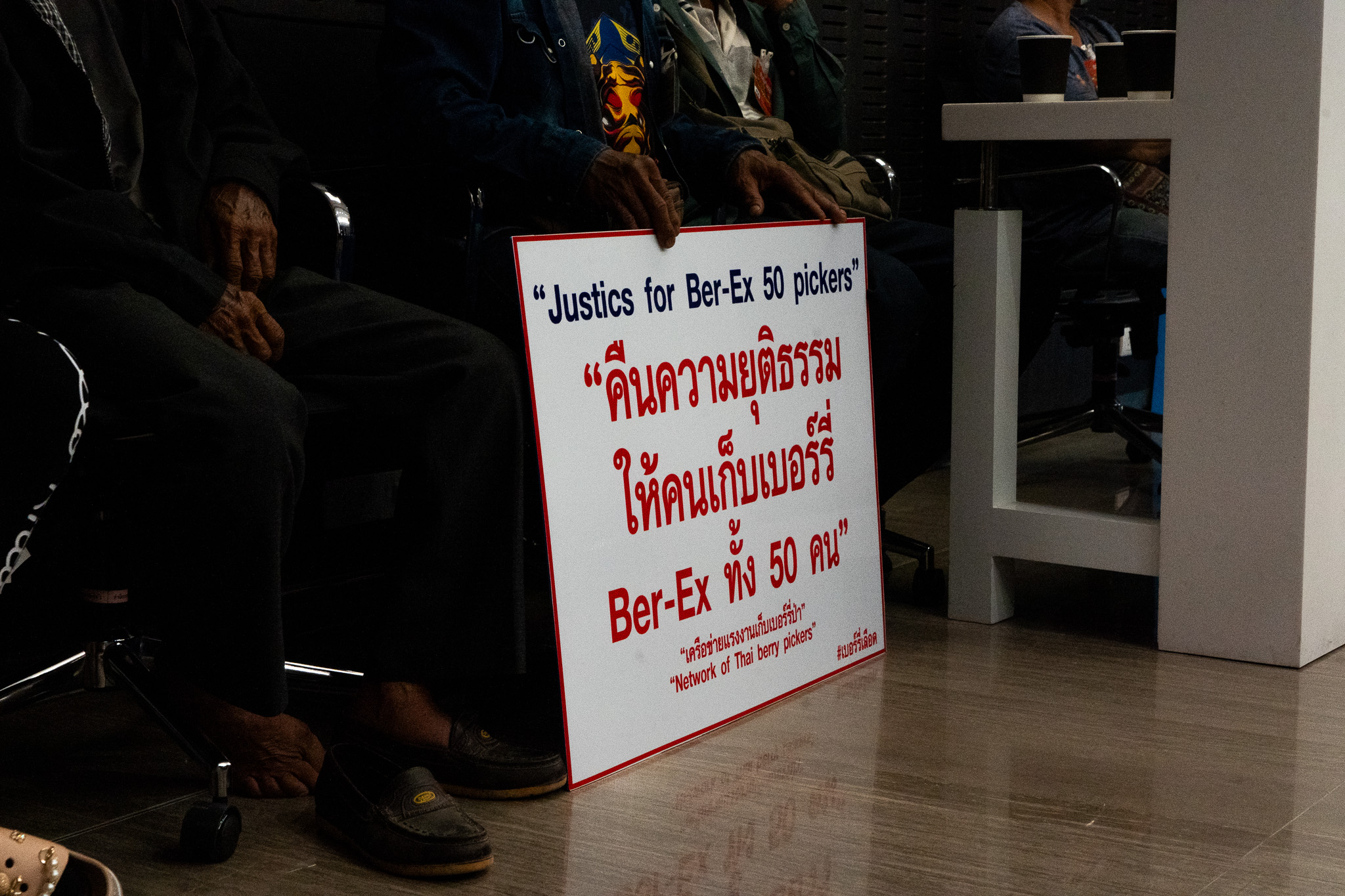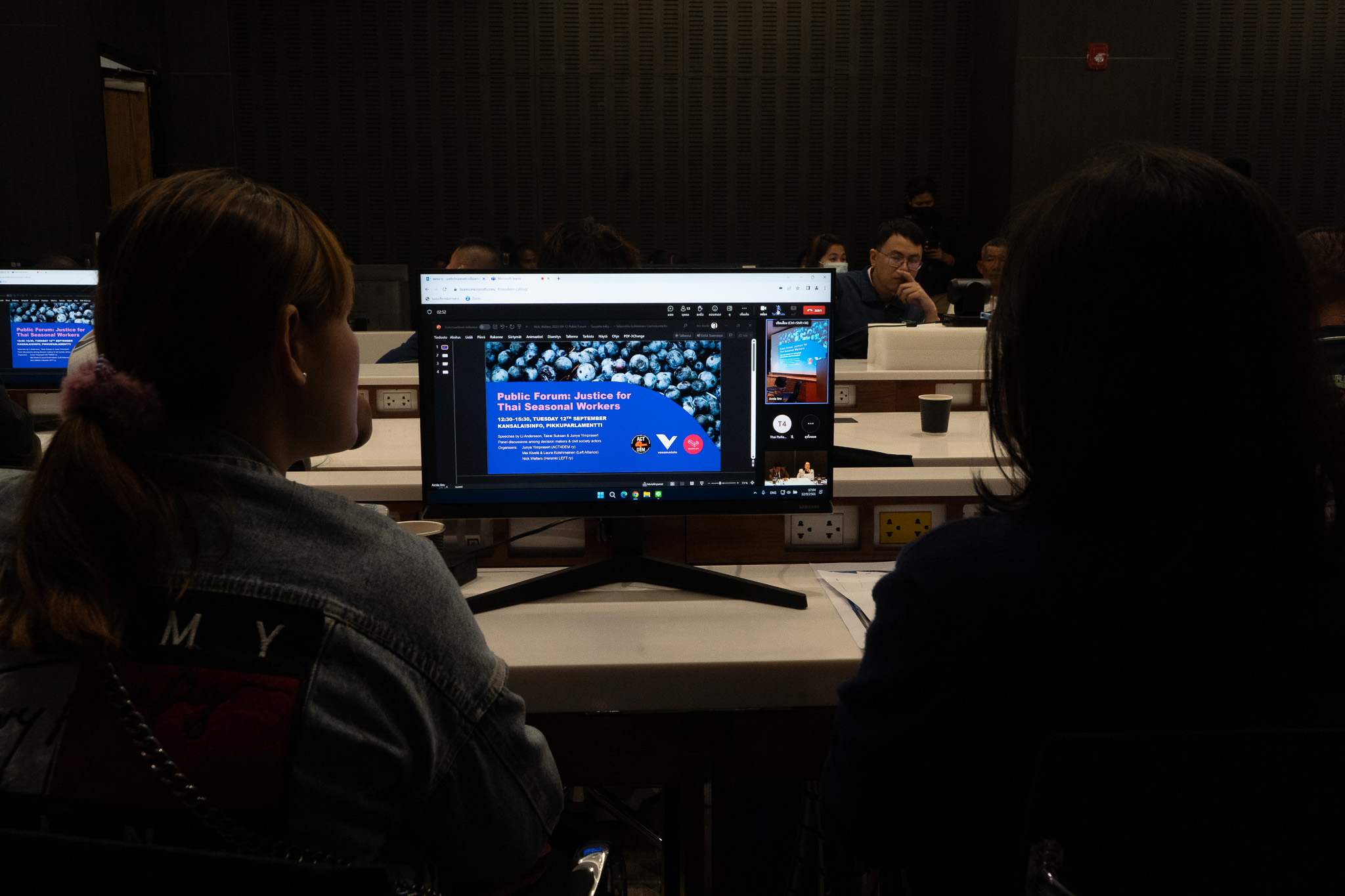To mark this year’s International Women’s Day, we feature Nittaya Muangklang, a woman fighter from Chaiyaphum who was drawn into her community’s fight to hold on to their land in the face of an aggressive government aiming to prosecute those it seemed as encroaching on national park land. The journey saw her take a leadership role in the fight, be prosecuted and imprisoned, and finally win her freedom. She’s learned a lot on the journey and encourages more women to take up the fight.
Jailed for fighting to reclaim the right to her family’s land, Nittaya Muangklang has found solace and enlightenment through her activism
Nittaya Muangklang has been fiercely fighting to seek justice for the impact that her family has borne stemming from the forest conservation policies imposed during the rule of former Prime Minister Prayut Chan-ocha.
She ended up in jail but stood her ground and appealed to the Supreme Court. She argued that her family’s use of the land they farm was legal because they took possession of the land before the conservation area of the Sai Thong National Park was established in Chaiyaphum Province.
“I could not afford to turn back. If I had turned back, I’d have been put in jail. If I kept going, there’d still be a chance that I’d prevail,” Nittaya says. “In the end, the Supreme Court sentenced me to a suspended jail term. I was in prison for 77 days.”
The fateful day for Nittaya was May 15, 2019, during a time when she was leading her community of Nong Bua Rawe district, Chaiyaphum province in the fighting for land rights. On that day, the Court of Appeals sentenced her and 13 other activists to jail on a range of charges related to land encroachment of Sai Thong National Park.
Nittaya was imprisoned in Chaiyaphum Provincial Prison for two-and-a-half months before the Supreme Court overruled the decision and instead imposed a three-year suspended sentence. Nittaya was released. But life in prison, a place she called “hell on earth,” changed her forever.
“Do you know what I was afraid of? I was afraid of those barbed wires curling on the wall of the prison. Even more frightening was when the vehicle I was in backed up into the entrance [of the prison] and I could no longer see my family which had sent me off,” she says, recalling her first impressions of being imprisoned. “I was so scared when they ordered me to strip off my clothes, turn, and bend over so they could check for anything hidden in my body. My mind then thought of the film, Butterfly in Grey.”
At that moment, she realized she was no longer in command of her life. Her every step was controlled. Besides fear, she also felt the insecurity of her new life in prison.
“That day, people in the prison took bets about what crimes newcomers had been found guilty of. They guessed that I had been arrested on drug charges,” she says. “I couldn’t sleep that whole night. I couldn’t sleep for several days afterwards. I was so disoriented.”
Prison food was not what “people would dare eat”
Disoriented and overwhelmed, Nittaya’s weight dropped from 49 kg to 44 kg over a span of two months. During the first week, she couldn’t eat anything provided by the prison.
“I couldn’t eat anything,” she says. “The prison food was inedible. Like, the mackerel porridge that they made–they cooked the whole fish without removing the head or the feces. They served noodles but they didn’t cook them. They put [the raw noodles] on a tray and just poured soup over them. Who could’ve eaten that? No one. There was vegetable stew with chicken, and there were chicken feathers all over in it. It would be amazing if anyone could’ve eaten it.”
Nittaya survived on the two bananas that they gave her every day, presumably from donations. She was later moved to the bakery shop. It was probably due to the fact that it was made public that a human rights organization was handling her case that Nittaya started to receive better food.
She was separated from the other 13 of her friends who had been jailed along with her. “I was kept alone,” she says. “Maybe they were scared I would start running a gang.”
Life before prison
Due to the bad economy, Nittaya left her job in a fabric factory in Bangkok in 2006 and returned to Chaiyaphum.
She had hoped to start a family in her hometown. Her father was at an advanced age and could not work like he used to. Nittaya soon became the main working force on her family’s cassava farm.
On July 12, 2015, officials of Sai Thong National Park detained and filed charges against 14 residents of Baan Sap Wai over a violation of the junta’s forest conservation policy. Four members of the Muangklang family were charged — Nittaya, her mother, and her two sisters.
Nittaya had never paid attention to the dispute before and never thought of becoming an activist because her family had never gotten into any trouble with the government officials, park rangers, or even the soldiers who had tried to seize her family’s land.
The arrest and detention in 2015 was the beginning of her fight to seek justice. She said her family’s land was included in the national park area in 1992, long after her family settled there.
“We have no other land,” she says. We have been there for so long now that we don’t have anywhere else to go. We don’t know where else we can live. If we don’t put up a fight, we’ll lose everything. We’d lose our land. We’d have to move away. I have my parents to provide for. My child is still in school. I have to fight.”
An uphill battle
Nittaya started by petitioning the Nong Bua Rawe’s district office, but to no avail. Then, she met Oranut Ponpinyo, a land activist with the Isaan Land Reform Network who gave her guidance on how to push for her cause more effectively.
Trying to petition on an issue during the rule of a military government however is like running an obstacle course. The country was governed by special orders that were undemocratic such as banning the gathering of more than five people, or an emergency decree that had been imposed.
“When I went to submit a complaint, an officer cursed at me and banged the table, pointing a finger into my face, and saying that I’d be arrested for violating the emergency decree,” she recalls. “I was shocked. My face went pale. I was really scared, but I didn’t want to show it. I had brought 39 other villagers with me. I didn’t want them to be scared. The officer also demeaned us, saying that we were just uneducated villagers.”
In fact, Nittaya says she was intimidated by state officials numerous times, despite her being deprived of her family’s land and was without a means to make a living. She was followed, visited at home – even at night time. That happened especially during an activism campaign called “We Walk” in 2016, when demonstrators marched from Nong Bua Rawe to oppose the Pong Khun Phet dam project.
“The police came to my place a couple of times but couldn’t find me. They then found me at the district office on personal business,” she recalls, still upset over the matter. “They asked if I was going to join We Walk. I didn’t even know the group that was organizing it. I was surprised to see the police at the district office when I was there with my child to request a name change.”
Although Nittaya was never sure if her name was on a watch list of a state security agency or not, she got invited to several events organized by government agencies. When there was a public consultation on the draft of the 20-year National Strategy Plan in Nakhon Ratchasima province, Nittaya was invited to join. But she made it clear that she didn’t want to take any part in it.
A mother. A wife. An activist
The fight for justice to reclaim the right of her family’s land was carried out at the expense of Nittaya’s time and efforts, time that she could’ve spent with her family, especially her teenage boy.
“He didn’t understand,” she says. “It may have been in part because he was 14-15 years old. He saw his mom was on the news through social media. He asked me, ‘Why are you doing this, mom? won’t you stop? I don’t want you to be in the news anymore.’”
She says her son was asking those questions because her son may have been asked those questions. Or maybe it was because some people in the community saw her as hotheaded and stubborn, and her son didn’t want her to be seen in that way. Nittaya says she then explained to her son that she had done nothing wrong, that she was being persecuted, and that she was seeking justice denied to her.
“I wanted my son to know the law,” she says, “so he wouldn’t be put at a disadvantage like his mom had been. I told him that I had to fight. I needed to learn the law. I had to take classes to find methods that could be applied to our problems.”
Her son, she says, came to understand. “Before the Supreme Court issued its ruling, he told me that he admired me because his mom is a fighter. His mom had done nothing wrong.” She says that finally he’d “come to understand why his mom had to put up such a fight.”
As a mother, Nittaya felt her son’s fear, his feeling embarrassed about his mom’s going to prison. She had asked her son if he was embarrassed. His answer cheered her up.
“I used to be embarrassed because I saw you in the news a lot. But now I understand what you’ve done. You’re not a criminal. You were being persecuted.”
Nittaya recalls just before she went to hear the appeal court’s ruling which sentenced her to four months in prison and a 40,000-baht fine.
“He asked why I had packed my sarongs and makeup. I said I was going to jail, but he didn’t believe me,” she says. “After hearing the verdict, he asked his dad but his dad was lost for words. When I was in jail, my son came to visit and he cried. I told my husband not to bring him again because I didn’t want to see him in that state.”
While imprisoned, she says she was worried sick about her son, especially after hearing that he wanted to drop out of school. She kept telling him not to give up. After she was released from the prison, her son became stronger.
Support from all around
During her ordeal, Nittaya says she received a lot of support from the people around her. She said a preschool-aged daughter of someone who was prosecuted in the same case alongside her once asked her, “If you go to jail, my mom will have to go to jail, too, right?”
The girl then wrote, “I don’t want my mom to go to jail. Please don’t turn my warmth into the cold.”
She says she cried after reading that message because the girl doesn’t have a father. Her mother was all she had, and the girl clung on to her mom’s arm throughout the reading of the verdict. The day that the Supreme Court handed down its ruling, the girl asked Nittaya the same question. But she didn’t answer as she already knew what was going to happen.
Nittaya says she never sought to lead her community into activism because she was one of those who bore the impact. But the situation compelled her to lead. Many times she was tired and disheartened, but she didn’t want to shed tears in front of her peers because she feared the tears would discourage the movement.
But there was one moment that made her feel weak in particular.
At the Supreme Court, the court tried to talk them into confessing their guilt, saying that they wouldn’t have to go to jail. The court denied their release on bail later that day. Nittaya said there was an old deaf woman who misunderstood that the court had approved their release on bail and showed her joy. Nittaya cried over that moment because she felt sorry. She said she was ready to stand alone at the Supreme Court because she didn’t want others to go to jail, but her friends told her, “If you go on, everybody will go on with you.”
A rally in front of the Chaiyaphum Provincial Court demanding release of the land activists
A female fighter
For the several years that Nittaya has stood in the front line fighting for her cause, she learned that she has not been the only one. Many women have risen up to defend themselves and their community.
“I saw many women taking part in activism while at the same time working in the fields and perfectly well taking care of their household chores,” she says. “There’s nothing wrong with activism. Most members of my group are also women.”
Nittaya’s experience of activism in Isaan has made her realize there were more and more women joining the fight. She’s also noticed that there are more men than women in activism movements in the North and the South of Thailand.
She’s not sure why this is, but guesses it is due to the culture in those areas imposes leadership roles on men rather than women.
“In my family, if my husband prohibited me from activism, I wouldn’t accept it,” she says. “He cannot restrict my rights.”
Learning the lesson
From the first day of her journey, although she’s had to pay a high price, Nittaya thinks her battle has given her a lot of lessons and experience. In particular, she’s come to see women activists in different situations. Some have lost their families because of their activism. Some communities have often changed leadership of their activism due to economic issues.
“What I’ve learned is that people who are without knowledge, who are uneducated, will often be oppressed by power and by law. Women or men can both be suppressed. When we know this, we can create leverage.”
Every time she joins other people in activism, Nittaya learns new things that can be adapted to her fight and her fight for her community.
“I think about other people’s mistakes rather than their success because I think there is a solution for every failure. Everyone who has succeeded must have gone through a failure before.”
Nittaya has stumbled – and learned – throughout her fight but she’s come to realize what the most important thing is — knowing her rights, something she’s learned through studying law.
“I want everyone to stand up for their rights,” she says. “If you have to go into a battle, go all the way. Don’t become dispirited. Don’t give in, even for a second. If we don’t give up, no one can do anything about that. Please hold firm to your ideology. Stand your ground. It might be exhausting but what we get back from it is worth it.”
As a woman fighter, she believes she must not leave things up to fate.
On March 3, 2020, the Supreme Court gave her a sentence of eight months in jail but also a three-year suspension of that sentence and a 30,000-baht fine. She also faces a fine for damage of 150,000 baht, the same amount set by the appeal court. In addition, she must continue to report to the court.
She still hopes.
“One day, I want to see a sustainable solution to land right disputes, and no poor person having to go to jail ever again.”





